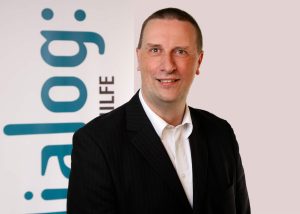The association Dialog (Dialogue) offers psychosocial and medical advice, help, and treatment for drug users and their families.
Director Helmut Schmidt explains the range of offers available to successfully help drug addicts:

Helmut Schmidt, Dialog, © Fototstudio Petra Halwachs
In Austria, people with an alcohol dependency problem and their families can get a broad range of help and treatment. What’s available and how specific it is depends on the province and region.
An addiction or alcohol dependency is a chronic illness that can manifest itself in numerous layers of problems. Intervention regimes have to take these into account by approaching the situation from a medical, psychological, and social angle. We at Dialog in Vienna offer such a comprehensive approach.
Our association, an outpatient provider with almost 40 years of experience in addiction aid, has been engaged as provider in a specific project geared towards people with alcohol addiction since April 2016.
In all three clinics of Dialog, alcohol-dependent people get comprehensive, multi-professional (medical and psychosocial) and individually tailored help. So far, more than 600 individuals have been treated or are still in treatment. The goal is to make people who suffer from alcoholism objectively and subjectively healthier and to integrate them into society. For us at Dialog, this also includes (re)integration into the job market, which is achieved by a complementary range of measures we offer.
What sort of help do you provide?
The range of help we offer as Dialog has been part of the programme “Alkohol. Leben können“ (Living with alcohol), which was created in October 2014. It is a project focused on the integrated care of people who suffer from alcoholism at the best point of service. The programme carriers and funding bodies are Pensionsversicherungsanstalt (PVA) (Social Security Administration), Wiener Gebietskrankenkasse (WGKK) (Vienna Regional Health Insurance Fund), and Sucht- und Drogenkoordination der Stadt Wien (SDW) (The Vienna Coordination Bureau for Addiction and Drugs). All special insurance carriers are already members of this alliance.
What needs do people suffering from alcoholism have?
In Vienna, more than 35,000 people are regarded as alcohol-dependent. However, the line between a chronic illness and problematic consumption is a blurred one.
Alcohol-dependent people have different needs from each other, all of which we try to address as best we can. That’s why both outpatient and inpatient care are possible, with a ratio of 2/3 to 1/3. Said care is provided by 5 carriers (Verein Dialog, Verein p.a.s.s., Verein Grüner Kreis, Anton Proksch Institut, Schweizer Haus Hadersdorf). Management is handled by the regional competence centre, with additional functions added on for interface management with the healthcare and social system (e.g. GPs, hospitals, municipal authorities).
How many people do you reach with these measures?
From mid-2016 to the end of 2018 alone, some 3,200 patients will have received help. At the moment, this programme still focuses on Vienna, but soon plans for a roll-out into the provinces and an increase in the number of participants will be put into action. This expansion is crucial to reach a higher number of chronically ill addicts.
Read more articles from this issue of our ESG letter here.
*ESG stands for Environmental, Social and Governance“ – These are the three broad categories according to which companies are examined in sustainable investment.
Legal note:
Prognoses are no reliable indicator for future performance.
Legal disclaimer
This document is an advertisement. Unless indicated otherwise, source: Erste Asset Management GmbH. The language of communication of the sales offices is German and the languages of communication of the Management Company also include English.
The prospectus for UCITS funds (including any amendments) is prepared and published in accordance with the provisions of the InvFG 2011 as amended. Information for Investors pursuant to § 21 AIFMG is prepared for the alternative investment funds (AIF) administered by Erste Asset Management GmbH pursuant to the provisions of the AIFMG in conjunction with the InvFG 2011.
The currently valid versions of the prospectus, the Information for Investors pursuant to § 21 AIFMG, and the key information document can be found on the website www.erste-am.com under “Mandatory publications” and can be obtained free of charge by interested investors at the offices of the Management Company and at the offices of the depositary bank. The exact date of the most recent publication of the prospectus, the languages in which the key information document is available, and any other locations where the documents can be obtained are indicated on the website www.erste-am.com. A summary of the investor rights is available in German and English on the website www.erste-am.com/investor-rights and can also be obtained from the Management Company.
The Management Company can decide to suspend the provisions it has taken for the sale of unit certificates in other countries in accordance with the regulatory requirements.
Note: You are about to purchase a product that may be difficult to understand. We recommend that you read the indicated fund documents before making an investment decision. In addition to the locations listed above, you can obtain these documents free of charge at the offices of the referring Sparkassen bank and the offices of Erste Bank der oesterreichischen Sparkassen AG. You can also access these documents electronically at www.erste-am.com.
N.B.: The performance scenarios listed in the key information document are based on a calculation method that is specified in an EU regulation. The future market development cannot be accurately predicted. The depicted performance scenarios merely present potential earnings, but are based on the earnings in the recent past. The actual earnings may be lower than indicated. Our analyses and conclusions are general in nature and do not take into account the individual characteristics of our investors in terms of earnings, taxation, experience and knowledge, investment objective, financial position, capacity for loss, and risk tolerance.
Please note: Past performance is not a reliable indicator of the future performance of a fund. Investments in securities entail risks in addition to the opportunities presented here. The value of units and their earnings can rise and fall. Changes in exchange rates can also have a positive or negative effect on the value of an investment. For this reason, you may receive less than your originally invested amount when you redeem your units. Persons who are interested in purchasing units in investment funds are advised to read the current fund prospectus(es) and the Information for Investors pursuant to § 21 AIFMG, especially the risk notices they contain, before making an investment decision. If the fund currency is different than the investor’s home currency, changes in the relevant exchange rate can positively or negatively influence the value of the investment and the amount of the costs associated with the fund in the home currency.
We are not permitted to directly or indirectly offer, sell, transfer, or deliver this financial product to natural or legal persons whose place of residence or domicile is located in a country where this is legally prohibited. In this case, we may not provide any product information, either.
Please consult the corresponding information in the fund prospectus and the Information for Investors pursuant to § 21 AIFMG for restrictions on the sale of the fund to American or Russian citizens.
It is expressly noted that this communication does not provide any investment recommendations, but only expresses our current market assessment. Thus, this communication is not a substitute for investment advice, does not take into account the legal regulations aimed at promoting the independence of financial analyses, and is not subject to a prohibition on trading following the distribution of financial analyses.
This document does not represent a sales activity of the Management Company and therefore may not be construed as an offer for the purchase or sale of financial or investment instruments.
Erste Asset Management GmbH is affiliated with the referring Sparkassen banks and Erste Bank.
Please also read the “Information about us and our securities services” published by your bank.
Subject to misprints and errors.



